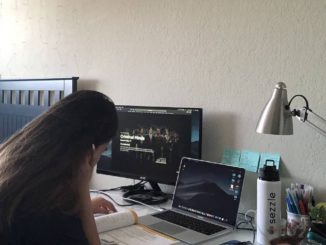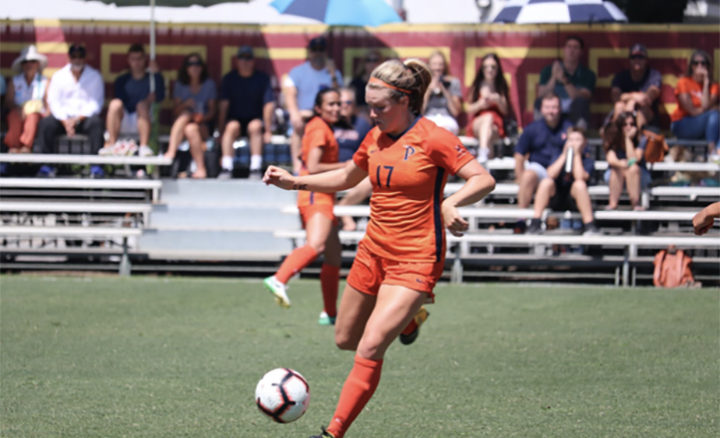
For first-year water polo player Kent Emden, the transition from high school to college sports affected more than just his level of competition. The mental game proved to be more challenging than he had ever known before. But for Emden, it was the support of his coaches and the athletics counselor that made all the difference.
“I don’t think if I would’ve committed to Pepperdine, I don’t think I would’ve gone to college at that point for water polo because I just kinda lost faith in water polo,” said Emden, water polo player and undeclared major. “I think what Merrill and Schroeder [water polo coaches] have done here to help this program grow and develop as just a family experience is just incredible.”
A 2011 study illustrates that 30% of students in college have felt depressed in the past year. About 50% of students reported feeling overwhelmed by anxiety, according to the NCAA in “Mind, Body and Sport: depression and anxiety prevalence in student-athletes.” In a 2014 survey, a University of Michigan study found that 30% of nonathletes who showed signs of a mental health condition actually sought help, while only 10% of student-athletes sought help. At Pepperdine, the trend may be slightly higher for the student-athlete population. A Pepp Post poll of 65 student-athletes found that 36.9% of student-athletes have sought out help with Pepperdine mental health services.
Additionally, the poll illustrated that 40% of student-athletes have sought out mental health support from the Pepperdine Athletics staff.
“There’s been a lot of ups and downs, honestly. I’ve seen a lot of good times and a lot of bad times, but overall it’s helped me grow as a person, and it’s been a beautiful journey,” said senior Justin Leutes, baseball player and communication major.
Pepperdine and student-athlete mental health
The student-athletes at Pepperdine have expressed support for mental health services offered within the Athletics department.
These services include athletics counseling, access to an athletics chaplain and the staff in the athletics department. There are team/group counseling sessions, one-on-one counseling, athlete Bible studies and more available to the student-athletes at Pepperdine.
The same Pepp Post poll found that 83.1% of the individuals feel at least moderately comfortable with the mental health services at the athletic department, with 56.9% of student-athletes feeling fairly open or very open to these services.
Some student-athletes at Pepperdine have recognized the importance of counseling services for the improvement of their performance in their sport.
“Honestly, the people that are mentally tough and mentally strong go see these people because they want to improve how they are mentally and how strong they are,” Emden said.
Currently, about 35% of student-athletes across the nation seek mental health support, according to Professor Daniel Eisenberg, a researcher from the University of Michigan.
The poll illustrated that student-athletes at Pepperdine are more open to seeking mental health support than the average found by Eisenberg.
“I feel like the stigma of asking for help is much, much less here at Pepperdine,” said Karina Herold, deputy director of Athletics. “We have so many student-athletes who are raising their hand and saying, ‘You know what? I think I do need that extra boost.'”
Sofia Shah, women’s swimming and psychology major, said she thinks Pepperdine provides helpful resources. .
“I actually think Pepperdine does a really good job with counseling,” Shah said.
Shah said there may be an opportunity for growth within the department.
“I think a lot of what I’ve noticed is a student-athlete is discovering that balance between school and academics and social life and maybe offering like workshops or ways to help with all of that,” Shah said. “Since we do have the resources of a sports psychologist [athletics counselor] and stuff like that, they should do like visualization workshops for like racing/game day, those kinds of things where it can apply to all types of sports.”
The services
The stigmas surrounding athletes reaching out for mental health support sometimes make it hard for them to make mental health a priority, but Pepperdine University does everything they can to ensure that their student-athletes will have the best support available, according to Alex Cushing, the athletics counselor for Pepperdine University.
“You know, everyone’s been taught like, just suck it up. Like just work hard, like play through it,” Packer said. “I still think you should work hard and play hard, but I still think mental health is just as important as your physical health, which I’ve learned too.”
The Pepp Post poll of 65 student-athletes found that a majority of them are open to mental health services at Pepperdine.
Pepperdine provides services to student-athletes to help them with a variety of needs. Among those services are academic support and mental health.
One of Pepperdine Athletics’ main services to student-athletes in accordance with mental health is Cushing. He was brought in this year, and due to how his position was spotlighted by the Athletics department, his role was easily incorporated into the program.
“I think that Pepperdine, because they have a set position already, it’s been an easy transition for me to come in and have my role and then just be able to do what I do as opposed to other universities, [where] I’ve had to advocate for myself and really advocate for student-athlete mental health and sport psych work,” Cushing said. “I truly believe that both of those are intersected; I mean you can’t separate one from the other because student-athletes are people. I’ve experienced, you know, real emotions, real circumstances, and that impacts sports as well.”
A former USA Youth National Team member and currently the starting goalie for Pepperdine Men’s Water Polo, Emden has had a busy start to his freshmen year. He said Pepperdine’s supportive culture and caring coaching staff are what ultimately lead him to continue the difficult journey he has had with water polo throughout his life.
“When I came here, the level of play was just so much higher, so much more intense,” Emden said. The services have helped him tremendously since he has been here. “Without it, I would definitely not be where I’m at right now.”
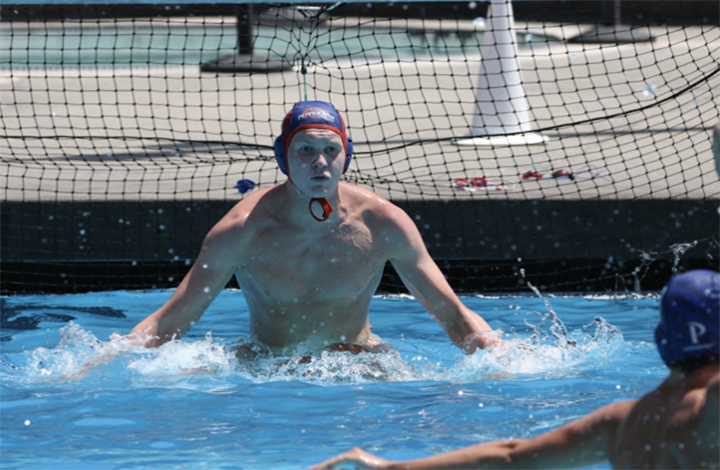
The Athletics Department works in hand with Pepperine’s vision of integrating the Christain faith into student-athletes’ lives and struggles by providing an Athletics Chaplain, Krista Lopata.
“I feel like I’m here basically to help student-athletes grow spiritually; I think that looks different depending on where they are on their faith journey, but that’s what I’m here to be available for,” Lopata said. “So I feel like my main role is just to build relationships with athletes and then, depending on how open and where they’re at, kind of introducing them to faith because I believe that that’s what will really help like long term.”
From having a small injury, to being a redshirt freshman for her second year playing soccer at Pepperdine University, sophomore Olivia Packer, soccer player and public relations major, had a difficult first year. Packer said she struggled to retain her identity throughout the injury, as well as know why this would happen to her after all these years of hard work.
Packer said it was through Krista Lopata, the Athletics Chaplain, that she found herself and soccer again.
“During my process, I’ve kind of lost my faith in a sense,” Packer said. “I didn’t understand why God would do this to me when I put, I worked so hard for it, for now it not to turn out the way I wanted to; ’cause I have a set plan for everything in my life and so it just made me realize like God has a plan for me as well.”
Every sports team at Pepperdine also has a designated academic advisor as well as at least one sports trainer.
For Justin Leutes, his academic adviser proved to be especially important throughout his struggles in baseball. Taking the junior college route, Justin Leutes started his baseball career at the College of Southern Nevada, before deciding to transfer his junior year. Leutes said the transition into academic and athletic life at Pepperdine was very difficult, but once he got to know the team and the academic advisers, he knew he would be just fine.
“I’ve found other people through the sports fields such as our coaches and my academic advisor, and they’ve been absolutely incredible, just kind of being there for me and giving me advice — not just with baseball but just in life,” Leutes said. “So it’s been beautiful just being able to work with them and talk to them and having them almost be like a father figure to me.”
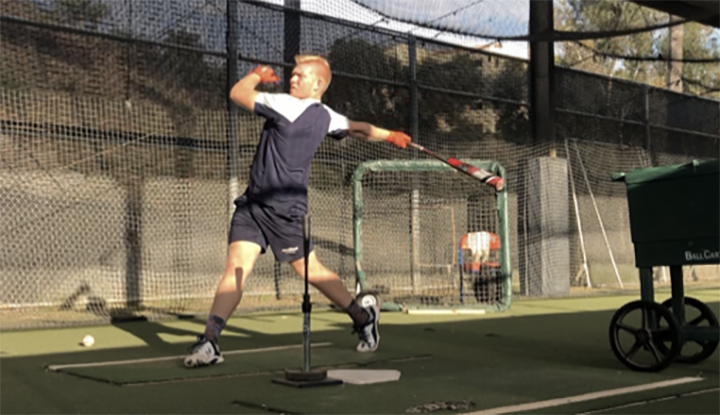
All of these people, in addition to the Athletic department, coaching staff and the teammates, are intended to be the support for the student-athletes at Pepperdine, Herold said.
Shah said the caring team environment and supportive teammates were very important to her during her mental health struggles.
She was supposed to compete in the 2016 Rio de Janeiro Olympics before that opportunity was stripped from her due to a combination of political factors that are still fairly unclear to her. Shah said she had an identity crisis and did not know if swimming would be in her future. She came to Pepperdine solely for academics and then reached out to the swim coaches about eight months after her start. Since then, she has loved every second of it.
“Pepperdine helped a lot because I’ve never actually been on a full team of girls and that was pretty awesome,” Shah said. She felt encouraged in ways she had not felt before. “It’s pretty cool to be part of empowering women, and coming from Asia, where women aren’t treated so well in sports, it’s pretty awesome to be here and respected.”
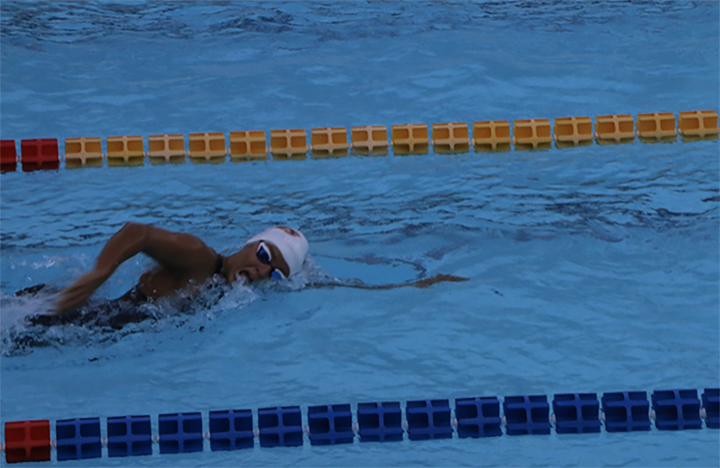
The Pepperdine Athletics department has a student-care team that was created two years ago that is intended to be in charge of making decisions about how to best approach student-athletes who may be in need of some of the services available, Lopata said.
“We’re so much more aware of what’s going on with the athletes because the athletic trainers or strength and conditioning and all your coaches can notice things,” Lopata said. “So then if someone gets brought up to our attention, that we bring into the student care team and then they handle it, which is also a huge help for me.”
The comparison
Cushing has worked at other colleges and universities, and from his experience, he has not seen an athletic department address mental health like Pepperdine does.
“Obviously different institutions have different priorities. Last year at Memphis [The University of Memphis], mental health with student-athletes was a priority, but not like this,” Cushing said. “Everybody at Pepperdine is really hands-on; everybody’s really supportive.”
Herold said mental health is very important to the Athletics department.
“We do a lot of mental health training, throughout the year with our coaches and staff,” Herold said. “So mental health is at the forefront of everything that we talk about.”
The National Collegiate Athletic Association (NCAA) provides research and mental health educational resources for universities to utilize when creating their mental health programs, but ultimately, it is up to the university.
“The NCAA leaves it up to the universities, depending on university funding and resources, to create a sport psych program or a mental health program just for student-athletes,” Cushing said. “So I know that other universities, they just utilize their counseling center and don’t have anybody specifically designated to student-athletes.”
The NCAA offers suggestions on the best practices for mental health programs for student-athletes.
“But, the idea from the NCAA is that athletics and the counseling center has a good relationship,” Cushing said.
Eisenberg explained that their Athletes Connected program seeks to offer a variety of resources to their student-athletes to support them.
“Our Athletes Connected program has been offering restorative yoga as a way for student-athletes to take care of both their mental and physical well-being,” Eisenberg said. “Also we and many other universities have been offering counseling services within the athletic department, which seems to be very well-received among student-athletes.”
The Pepperdine Athletics Department does everything they can for student-athletes, Herold said.
“That is our goal when you leave here and graduate — that you have actually exceeded your own expectations,” Herold said. “And so anything that we can do to help that, we’re going to do it.”
Julianna Birlin completed the reporting for this story under the supervision of Dr. Elizabeth Smith and Dr. Theresa de los Santos in Jour 241 in Fall 2019. Dr. Smith supervised the web story. Dr. de los Santos supervised the visual package.



